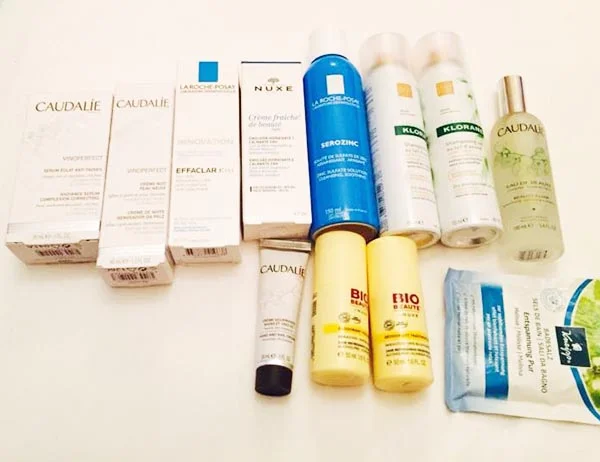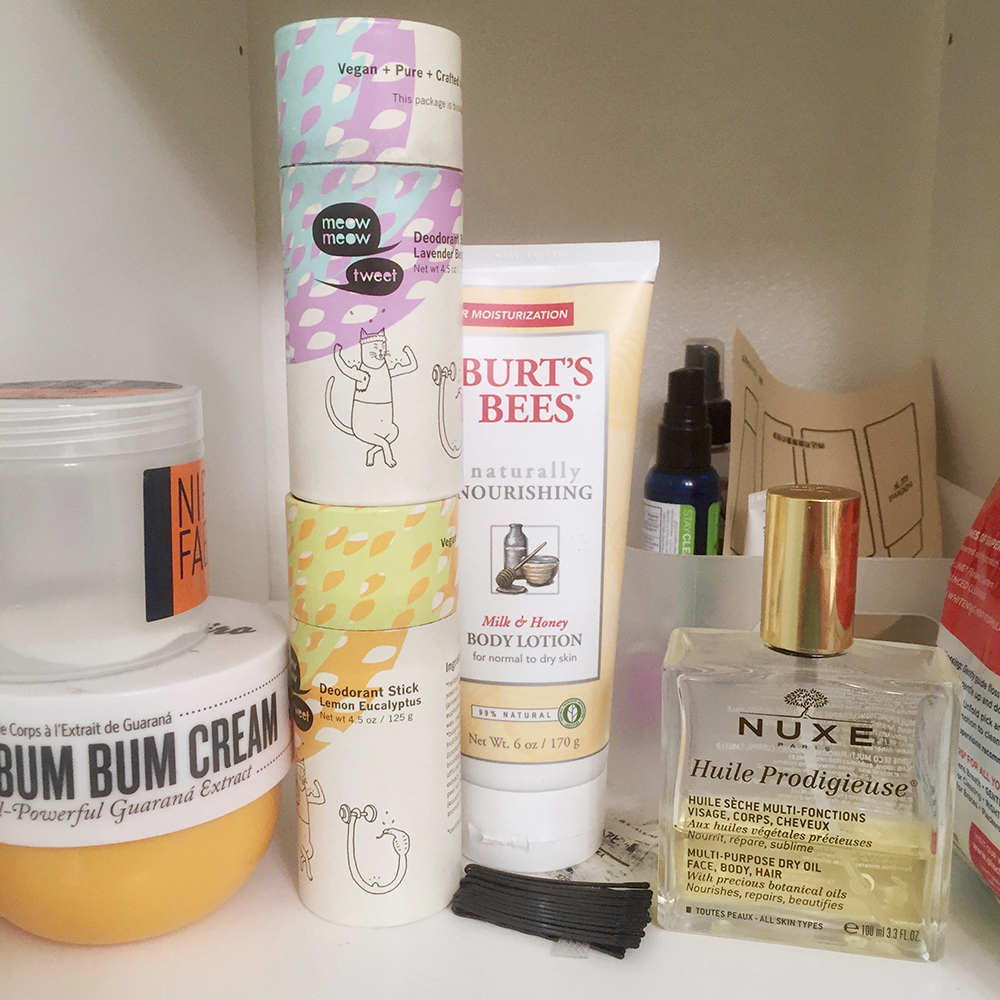Skincare 101: Easy Steps To Better Skin
/Is there anything more vexing as trying to attain perfect, flawless skin? Okay, maybe running out of coffee. That is up there in the realm of things being "the worst." But here's the thing I feel compelled to get out of the way off the bat- perfect and flawless skin that looks literally like porcelain is more the work of Photoshop than beauty products, and it's a standard that is nigh non-existent in reality. Nothing in a bottle will actually turn back time, despite how clever or catchy marketing is.
What you can attain, however, is improving what you have to work to a more reasonable standard, ie- giving dull skin more glow, finding ways to tackle acne, improving hydration, etc. You will be hard pressed to suddenly become actually poreless, so let's shift that thinking out the window because trying to live up to impossible standards is quite tiring in the end.
Admittedly, this post is the result of a few co-workers who know I'm fairly obsessed with skincare asking me stuff, so I figured having one basic introductory master post would be easier to point towards, and maybe it'll be a port of call to help others as well. Generally, I follow a lot of the fantastic Caroline Hiron's advice when it comes to product and routines, but I'm also starting to really like Gothamista on YouTube as well. Definitely give both a look at as there's loads more to deep dive into on their sites and channels. For reference- my skin is combination, often dehydrated, and can sometimes be a bit a sensitive. While you may have a different skin type, the advice and suggestions I've laid out below can generally work for most all skin types.
The General Basics
These are some overall basic things you can do to start really improving your skin, ranging from easy to your-willpower-may-vary. Doing one or most or all of these can really benefit your skin in the long run, even if it means putting that cupcake down.
Drink More Water- this is one of the best, affordable, and easiest things you can do to improve your skin. Hydration is crucial to body functions, and dehydration can cause skin to be dull, lackluster, and parched. Aiming to get at least 7-8 cups a day can help a lot in the long run.
Cut Down On Sugar & Alcohol- Sugar is super addictive because honestly it is so tasty sometimes, but it's also overall not great for you and can affect your skin. Sugars (mostly talking about processed sugars/simple carbs) can cause inflammation that will result in breaking down the collagen and elastin in our skin, ie- the things that help keep skin firm. Same with alcohol, which can make you puffy and red. If you can cut down on or even cut out one of both of these things, your skin will be better for it.
No Smoking- Smoking, aside from being super unhealthy overall, is also damaging to the skin, especially around the mouth. This one is a no-brainer in terms of taking better care of yourself and your skin.
Be A Vampire- you know why vampires are immortal and don't age? They don't get UV exposure! Okay vampires probably aren't real, except for possibly Keanu Reeves, but the point still remains: while it's good to get some sun exposure so your body can create more Vitamin D, UV rays aren't super great for your skin so it's pretty important to use sunscreen. Sunscreen is one of the best means of anti-aging skincare as prolonged UV exposure over the years can age the skin faster.
Balanced Diet- it sounds cliche, but a balanced diet really does help you not only feel good, but help your skin look good. Certain deficiencies like iron can make dark circles worse, and getting enough anti-oxidant, vitamin and mineral-rich food can really help from within.
Be Consistent- as in, try not to be constantly switching your routine around all the time. It takes 2-3 months for your skin to get used to any changes in routine and to see results, so be patient. Switching around stuff too much can actually make things go a bit haywire.
Be Gentle- even if your skin is an oil slick or acne-prone, you do not want to be harsh with your skin. This can actually make it so much worse. Grainy scrubs on the daily really don't help, but if you must once a week is okay and try to find something with finer grains. I'm more a washcloth when cleansing person and I try not to rub too hard. Facial skin is delicate, treat it as such.
Oily/Acne Skin? Moisturize Anyway- It may seem counter-productive, but oily and acne-prone skins should still moisturize to keep skin balanced so you don't start overproducing oil to compensate. There are a lot of great oil-free, lightweight moisturizers out there perfect for these skin types, and this is where you'd want to shy away from ones with shea butter or prominent in the butters and possibly essential oils. This is actually where I do like Neutrogena products; I may hate the shit out of their oily skin/acne cleansers, but they do a lot of nice serums and moisturizers from lightweight to super emollient. Also, moisturizing gels can be a good sub for lotions.
Routines
Here are a couple guidelines I follow with my morning & evening routines: no foaming/super soapy cleansers as they overly strip the skin and can be too harsh, when layering products you want to go thinnest to thickest for the most part, and you want to give active products like serums, vitamins, treatments, retinol, etc. a few minutes to absorb before moving on to the next product. And any cleansers marketing towards "Oily/Acne" skin? Walk away, unless your dermatologist has recommended otherwise. These strip the skin too much and can actually make your skin work overtime to produce more oil and can disrupt your skin's barrier balance too much.
If you have sensitive skin you might want to shy away from products that heavily feature shea butter or essential oils since these can sometimes be irritating, but as always test to see what your skin tolerates, same with mineral oil.
Also, it will be very apparent I use a lot of products from The Ordinary brand, which is basically because it's a) super affordable, b) super straightforward, c) cuts out a lot of faff ingredients that jack up the cost, and d) let's me get pretty nerdy about mixing, matching, and being specific as products go with what I need. They also just work well, at least for me.
Morning Routine
- Cleanse- this seems to polarize a few people, and a lot of people feel a splash of water will do, but I personally have to cleanse my face in the morning since I do skincare at night. Also, got to wash away dead skin, oil, sweat, etc. My current fave cleansers that are gentle, non-foaming, and effective are: No. 7 Beautiful Skin Melting Gel Cleanser, NUXE Cleansing Milk With Rose Petals, Burt's Bees Sensitive Facial Cleanser, Trilogy Cream Cleanser or Trilogy Active Enzyme Cleansing Cream. Sometimes when I have a new pot of it and I'm feeling fancy, I might opt to use Emma Hardie Moringa Cleansing Balm instead but it is a- a bit pricy and b- from the UK, so I tend to ration it wisely when I buy it.
- Hydrating Toner- this is more optional if I feel like I need it that day. I really like Clinique Moisture Surge Spray, Caudalie Grape Water, Trilogy Hydrating Mist Toner, and Meow Meow Tweet Face Toner.
- Eye Cream- personally I think eye creams are overall bullshit, but sometimes I will use First Aid Beauty Triple Eye Remedy
- Serum or Vitamin C- serums can help overall treat a lot of things like brightness, hydration, skin tone, etc., and Vitamin C is especially good for brightening and skin tone and helping with any sun damage. That being said, I generally pick one or the other depending on the day but you could layer them if that's your preference. For serums I really like The Ordinary Buffet and First Aid Beauty Ultra Repair Hydrating Serum since usually I'm using a serum to tackle dehydration. For Vitamin C I love Ole Henriksen Truth Serum or ones from The Ordinary range.
- Moisturizer- for morning I keep it pretty simple in terms of moisturizer. Up & Up makes a great daily one, and I also like NUXE Creme Fraiche de Beaute Light. In warmer months I like to switch it up and use La Roche Posay Effaclar K+ when I know I'll be a bit oilier.
- SPF- suuuuuuuuuuuuper important. Especially if you use AHAs, Vitamin C, and retinol. Any one that works for your face will do. I'm really digging Pixi Sun Mist lately.
Night Routine
- First Cleanse- I wear makeup and SPF basically daily, so I opt to double cleanse with my first cleanse being either cleansing balm or cleansing oil so I really get all the makeup and sunscreen off. For cleansing balms my faves are the Emma Hardie one, Trilogy Makeup Be Gone Cleansing Balm, and Botanics Hot Cloth Cleansing Balm. For cleansing oils, some great ones are Simple Hydrating Cleansing Oil, Palmer's Cocoa Butter Skin Therapy Facial Cleansing Oil, or Josie Maran Argan Cleansing Oil.
- Second Cleanse- here I just use one of the same cleansers I use in the morning.
- Masks- I only do this 1-2x a week, but this is where I would do something like a clay mask. Anything that's a hydrating, wear overnight mask would be in lieu of night cream and my last step.
- Acid Toning- mostly using AHAs, this helps brighten the skin and help make products applied after sink in better. I try to go gentle with these, and I really like Pixi Glow Tonic, First Aid Beauty Facial Radiance Pads, Nip + Fab Glycolic Fix Pads or the Extreme version (they're not actually harsh), Clarins Gentle Exfoliator Brightening Toner.
- Hydrating Toner- optional step, same kinds as morning.
- Treatement and/or Retinol- this is where you pick your treatment. I usually do retinol most nights, but there are 2 nights a week I'll do The Ordinary Lactic Acid 5% to do a bit more stronger (but still gently) exfoliate and skip retinol. I will, however, layer the Ordinary Niacinamide 10% + Zinc 1% under retinol to help with any inflammation and keep pores generally look good. As for retinol, I've been using and liking The Ordinary Retinol Advanced 2%. If I have spots, I'll use the Niacinamide, wait a few minutes then use a spot treatment with 2% Salicylic acid (Up & Up does a great cheap one), and follow up with some facial oil but likely skip night cream.
- Facial Oil- this is one of those super preference things as some oils do better one person and not another and it's worth trying a few to see if your skin does better with rosehip or jojoba or almond etc. The three I generally like that don't make my skin upset are Trilogy Anti-oxidant+ Rosehip Oil, The Ordinary 100% Organic Cold-Pressed Rosehip Oil, Josie Maran 100% Pure Argan Oil Light.
- Night Cream- I've been using and liking 29 by Lydia Mondavi Repairing Night Cream but there's such a wide array of good creams on the market by Olay, NUXE, Garnier, No 7, etc. that I think this is one of those find what works for you.
So, longwindedly, that is sort of my basic overview without getting too specific into certain issues and hopefully this helps you navigate how to take care of your skin and give you an idea of routines.














